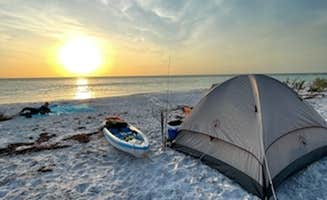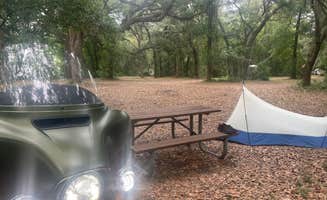Dispersed camping near Largo, Florida primarily centers around water-accessible sites on coastal preserves. The region's subtropical climate creates hot, humid summers with temperatures regularly exceeding 90°F and mild winters with temperatures rarely dropping below 50°F. Primitive sites often experience strong coastal breezes and occasional afternoon thunderstorms during summer months, requiring proper tent anchoring and rain protection.
What to do
Shelling excursions: Shell Key Preserve offers exceptional shelling opportunities, especially after storms or during low tides. One camper noted, "We saw sting rays, a baby turtle, many different birds & other wildlife within 5 minutes of parking the boat."
Kayak exploration: Paddle around Anclote Key Preserve State Park Campground to discover secluded beaches and wildlife. A visitor shared, "Spend your day swimming and sunbathing at the beach or kayaking around the island. If you arrived by motor boat try a bit of flats fishing but stay in designated areas and remember most area around the island in NO WAKE."
Bird watching: The region hosts over 40 bird species at Anclote Key alone. Pack binoculars to spot nesting shorebirds, especially during migration seasons. One camper observed, "There are over 11,000 acres full of migrating and native shorebirds and other creatures that have made their way to the island."
What campers like
Solitude after daytrippers leave: Coastal primitive camping sites often become significantly quieter in evening hours. A visitor to Anclote Key remarked, "During the day there were quite a few boats on the island but by about 4pm we basically had the island to ourselves."
Night sky viewing: With minimal light pollution, island camping provides excellent stargazing opportunities. One camper at Shell Key Preserve shared, "Enjoy a night of primitive camping under the stars without a sound except insects and lapping waves on the beach."
Accessible wilderness: Many sites offer a genuine wilderness experience within relatively short boat distances from civilization. A Shell Key visitor noted, "Pick a spot on the beach and you're good to go... The key is right across from South Beach at DeSoto so you're bound to hear some loud music from motor boats during the day, but it clears out and feels super remote by evening."
What you should know
Strict regulations: All primitive sites enforce leave-no-trace principles. According to one Shell Key camper, "EVERYTHING- and they mean everything you bring on the island must be taken off with you! There are no bathroom facilities and all human waste must be buried well and paper take in trash."
Weather considerations: Upper Hillsborough Water Management Area provides inland alternatives during unstable coastal conditions. A visitor noted, "We were the only ones there for the weekend, probably because of the summer heat. However, it was nice and free."
Limited facilities: Most primitive sites have minimal or no amenities. Pack accordingly with portable toilets, ample drinking water, and sun protection. A Shell Key visitor cautioned, "You do need to be mindful that there are lots of plants, shrubs, sticks and stones which can make being in a tent pretty rough if you don't have a good pad and a tarp to protect your tent."
Tips for camping with families
Secure food storage: Island camping requires careful food management to prevent wildlife encounters. According to one Anclote Key visitor, "Make sure all food is secured (we anchored our boat with provisions on board a bit off shore and swam in to no risk raccoons getting into gear as it was a calm night with clear weather)."
Weather monitoring: Check marine forecasts carefully before departing with children. One camper at St. Pete rest area (north) advised watching wind conditions, particularly during winter cold fronts when north winds can make return paddling journeys difficult.
Insect preparation: Summer months bring increased insect activity. One Anclote visitor warned, "Make sure to have everything you need, too, especially bug spray — the mosquitos (among other bugs) are insane during the summer."
Tips from RVers
Inland alternatives: When coastal primitive camping is impractical, Upper Hillsborough Water Management Area offers drive-in options. A visitor described, "Large open area with great shade trees, no water, privy. Easy pull through for RV. Tent spots. Fire rings."
Seasonal timing: Winter months (November-February) typically offer the best RV camping weather with lower humidity and fewer insects. Summer visits require additional cooling considerations since hookups are not available at dispersed sites.
Self-containment: RVers must be fully self-contained at primitive sites. One camper noted, "Just take your trash with you, leave no trace, and it was an enjoyable and free experience!"




